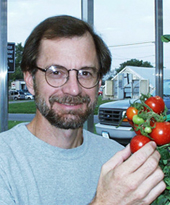Hageman Lecturer

Dr. Steven TanksleyLiberty Hyde Bailey Professor of Plant Breeding October 12-13, 2005Lecture: "The Molecular Basis of Quantitative Trait Variation: Examples from the Tomato" Colloquium: "Use of wild genetic variation in plant improvement" |
When you first bite into a juicy ripe tomato, you probably aren't thinking of the multitude of genes that have to turn on and off in the right order to make it both ripe and juicy, but someone is. Tomatoes are a crop with high economic value and many different uses. There is thus scope for divergent breeding for desirable traits, and a need to continually improve resistance to diseases. As examples, Tanksley's group has identified genes involved in developmental control of "yellow stuffer" tomatoes, pear tomatoes, processing tomatoes, tomatoes with different sized seeds, and tomatoes with resistance to several diseases. Intensive molecular mapping (e.g. with RFLPs) to define markers has greatly facilitated effective breeding strategies. Many of the traits involved are the result of quantitative gene expression, and the Hageman Lecture will focus on the molecular mechanisms involved.
About the speaker
Steven D. Tanksley began work with tomato genetics as a graduate student with C.M. Rick, at UC-Davis in the late 1970s. Through his efforts, tomato rapidly became the first dicot for which a genetic map could be connected to a physical map of the 12 chromosomes. As molecular techniques became available, Tanksley pioneered their application to further the study of tomatoes. His publication list runs to a dozen pages with his recent research emphasis focused on three areas: identifying key determinants of the change from wild plants with small berries to the modern cultivated tomato which may be several hundred fold larger in volume and diverse in shape, color and structure; developing comparative genomics of other crops such as eggplant, potato, pepper, and petunia; devising new molecular breeding techniques. All of these are based on his major contributions to the sequencing and molecular genetic mapping of tomato, which came to fruition in the early 1990s. Gene maps of the other solanaceous species show large blocks of similarity, with interesting rearrangements of chromosome segments from which evolutionary relationships can be seen.
Dr. Tanksley obtained his B.S. in Agronomy from Colorado State, and following his PhD and post-doctoral at Davis, was an Assistant Professor at NMSU in Las Cruces, prior to moving to Cornell in 1985. In 1995 he was appointed Liberty Hyde Bailey Professor of Plant Breeding, in recognition of the eminent botanist who preceded him. He was elected to the National Academy of Sciences in 1995, and has received several international honors including the Alexander von Humboldt Foundation Award in 1998, Martin Gibbs Medal of the ASPP in 1999, Wolf Foundation Prize in Agriculture in 2004 and the Kumho Award in Plant Molecular Biology and Technology in 2005. He also received an Outstanding Undergraduate Mentor Award, and a number of recognitions for his contributions to genetics. The Kumho Award was given in recognition of his many contributions including cloning of Pto tomato locus, one of the earliest resistance genes to be cloned, a kinase that provides a model paradigm for disease resistance.
The workshop will focus on use of wild species to introduce genes for novel traits, particularly disease resistance. Tanksley's group has worked with rice, as well as tomatoes. As widely disparate as these two plants are in growth habit and commercial product, they share in common the presence of wild relatives harboring a wealth of useful genes. The challenge is integration of those genes into valuable commercial cultivars without provoking concerns about GMOs.